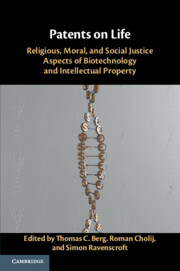 Patents on Life
Patents on Life Book contents
- Patents on Life
- Patents on Life
- Copyright page
- Contents
- Contributors
- Prefatory Note and Acknowledgements
- Opening
- I Life Patents, Law, and Morality
- II Religious Perspectives on Life Patents
- 5 Intellectual Property Rights and the Fundamental Right to the Commons in the Light of Catholic Social Teaching
- 6 Human Rights and Life Patents: Lessons from the Church’s Social Teaching and Engagement in the United States
- 7 Intellectual Property and Genetic Sequences: A Jewish Law Perspective
- 8 Intellectual Property, Islamic Values, and the Patenting of Genes
- 9 Christian Libertarianism and the Curious Lack of Religious Objections to the Patenting of Life Forms in the United States
- 10 From Chakrabarty to Myriad and Beyond: Catholic Contributions to the Gene-Patenting Debate
- III Social Justice and Political Aspects
- Closing
- Index
7 - Intellectual Property and Genetic Sequences: A Jewish Law Perspective
from II - Religious Perspectives on Life Patents
Published online by Cambridge University Press: 28 September 2019
- Patents on Life
- Patents on Life
- Copyright page
- Contents
- Contributors
- Prefatory Note and Acknowledgements
- Opening
- I Life Patents, Law, and Morality
- II Religious Perspectives on Life Patents
- 5 Intellectual Property Rights and the Fundamental Right to the Commons in the Light of Catholic Social Teaching
- 6 Human Rights and Life Patents: Lessons from the Church’s Social Teaching and Engagement in the United States
- 7 Intellectual Property and Genetic Sequences: A Jewish Law Perspective
- 8 Intellectual Property, Islamic Values, and the Patenting of Genes
- 9 Christian Libertarianism and the Curious Lack of Religious Objections to the Patenting of Life Forms in the United States
- 10 From Chakrabarty to Myriad and Beyond: Catholic Contributions to the Gene-Patenting Debate
- III Social Justice and Political Aspects
- Closing
- Index
Summary
An important, contemporary controversy is how the policy balance of incentives that provides the basic rationale for intellectual property (IP) protections should be assessed in the context of protection for genetic sequences. After summarizing this general rationale and the state of the law in the US concerning the protection of genetic sequences, the chapter consider the issues from the perspective of Jewish law. While the classic texts of Jewish law for the most part preceded the rise of IP law by centuries, we argue that a distinctly halakhic theory of IP can nonetheless be derived from the application of Talmudic unfair-competition principles to IP questions by halakhic authorities beginning in the Early Modern period. We further contend that because this Talmudic doctrine is equitable in nature and operates to protect broad social interests, it provided halakhic authorities with a more flexible, context-sensitive model for IP law than does the personal-property basis undergirding much of secular, contemporary patent and copyright law. Finally, we suggest that if contemporary courts were to adopt such a model for IP, halakha could offer various insights regarding policy considerations and value judgments pertinent to determining patent eligibility for genetic inventions.
Keywords
- Type
- Chapter
- Information
- Patents on LifeReligious, Moral, and Social Justice Aspects of Biotechnology and Intellectual Property, pp. 113 - 132Publisher: Cambridge University PressPrint publication year: 2019
